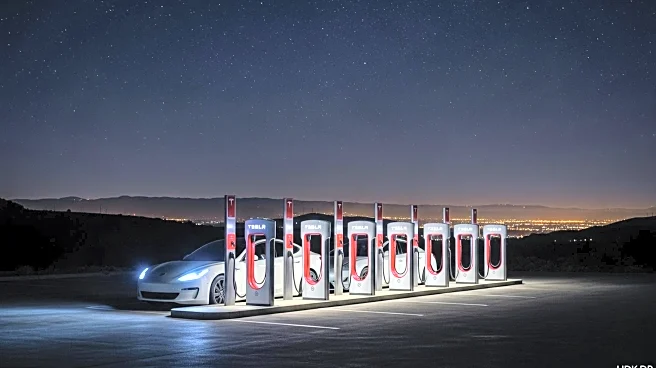What's Happening?
Tesla has unveiled its latest 'Master Plan IV,' indicating a strategic shift away from traditional car manufacturing towards a focus on autonomous vehicles and robotics. The plan, released by CEO Elon Musk, emphasizes the development of robotaxis and humanoid robots, suggesting that Tesla's future lies in AI-driven technologies rather than electric vehicles. Despite Tesla's historical success in the EV market, the new plan does not mention any upcoming electric car models, highlighting a departure from its previous strategies. This shift comes as Tesla faces increased competition from Chinese EV manufacturers and declining global sales, partly attributed to Musk's political stances.
Why It's Important?
Tesla's pivot away from car manufacturing could have significant implications for the automotive industry and the broader market for electric vehicles. As a pioneer in the EV sector, Tesla's move may influence other automakers to reconsider their strategies, potentially slowing the momentum of EV adoption. The focus on AI and robotics aligns with broader industry trends towards automation, but it also raises questions about Tesla's ability to maintain its market leadership in the face of emerging competitors. The shift could impact Tesla's financial performance, especially if the ambitious goals outlined in the master plan are not met.
What's Next?
Tesla's future actions will likely focus on advancing its autonomous vehicle technology and expanding its robotics capabilities. The company may face challenges in achieving the targets set in the master plan, including deploying millions of robotaxis and robots. Stakeholders, including investors and industry analysts, will be closely monitoring Tesla's progress and its ability to navigate the competitive landscape. The success of this strategic shift will depend on technological breakthroughs and market acceptance of autonomous solutions.
Beyond the Headlines
Tesla's move away from car manufacturing could have broader societal implications, particularly in terms of employment and environmental impact. The transition to AI-driven technologies may lead to job displacement in traditional automotive roles, while the focus on sustainability could drive advancements in clean energy solutions. Additionally, the ethical considerations of deploying autonomous vehicles and robots will need to be addressed, including issues of safety, privacy, and regulatory compliance.









